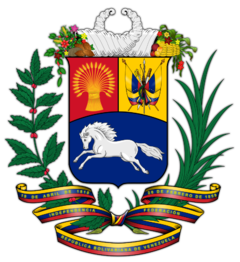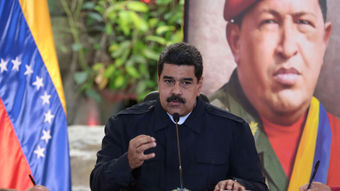Bolivarian Missions
 | |
The Bolivarian missions are a series of social programmes implemented under the administration of former Venezuelan president Hugo Chávez and continued by Chávez's successor, Nicolás Maduro, focused on anti-poverty measures by providing educational services, free health clinics, subsidised food and other forms of support.[1]
The misiones, funded by the state-owned oil company PDVSA, draw their name from the historical South American hero, Simón Bolívar, whose ideology (Bolivarianism) defined political sovereignty as meaningless without economic sovereignty.[2]
Anti-poverty
Using increasing oil prices since the early 2000s and funds not seen in Venezuela since the 1980s, Chávez created Bolivarian missions, which entailed the launching of government anti-poverty initiatives,[3] the construction of thousands of free medical clinics for the poor,[4] indigenous rights,[5][6] and the provision of food[7] and housing subsidies.[8] The Bolivarian missions are overseen with widespread experimentation in what Chávez's supporters call "citizen- and worker-managed governance."[9]
Helping the poor

There are now more than two dozen misiones including:
- Mission Robinson which improves literacy and education among both young and old;
- Mission Sucre which provides free higher education;
- Mission Barrio Adentro (or inside the neighbourhood), which provides comprehensive and community healthcare, began as small clinics implanted in poor neighbourhoods, run by doctors imported from Cuba. Barrio Adentro now boasts high-tech diagnostic centres and popular clinics, which are treating more than 17 million people. Critics complain that the care is sub-par but waiting rooms brim with babies being vaccinated, mothers - some as young as 15 - seeking checkups, and the elderly being treated for everything from high blood pressure to tooth pain;
- Mission Mercal supermarkets: there are an estimated 12,000 Mercals in Venezuela, selling everything from subsidised sausage to shampoo. One recent survey found that 47 percent of Venezuelans now shop in these stores;[10]
- Mission Música which helps youth learn instruments and take up music careers (300,000 children in 5,000 orchestras);
- Corazón Adentro which promotes art and culture; and,
- Mission Viviendas is a massive house building programme for the poor totalling 1.6 million homes.[11]
Thanks to the Bolivarian missions over the past 18 years, poverty has declined from 43% to 26%, extreme poverty from 17% to less than 7%, children attending school increased from 6 million to 13 million, college attendance has quadrupled, illiteracy eradicated in 2005 and infant mortality dropped by 50%.
The Bolivarian movement aims to unify Chavismo and prevent the counter-revolutionaries from winning power.[12]
Related Document
| Title | Type | Publication date | Author(s) | Description |
|---|---|---|---|---|
| Document:Coordinating Regime Change in Iran and Venezuela | diplomatic communication | 25 August 2010 | Trowbridge Ford | Iran and Venezuela, prime candidates for regime change |
References
- ↑ Heritage, Andrew (December 2002). Financial Times World Desk Reference. Dorling Kindersley. pp. 618–621. ISBN 9780789488053.
- ↑ "Down from the Mountain"
- ↑ UNICEF. (UNICEF, 2005). "Venezuela’s Barrio Adentro: A Model of Universal Primary Health Care". Retrieved 15 October 2005. UNICEF, p. 2. "Barrio Adentro ... is part and parcel of the government's longterm poverty-reduction and social inclusion strategy to achieve and surpass the Millennium Development Goals."
- ↑ https://web.archive.org/web/20061024054050/http://www.ops-oms.org.ve/site/pwr/docs/CCS_MS_OPS-OMS.pdf
- ↑ Maurice Lemoine. "How Chavez changed life in the tribal territories: New rights". Le Monde diplomatique, July 2007.
- ↑ http://ipsnoticias.net/nota.asp?idnews=3562
- ↑ http://www.eluniversal.com/2006/03/04/eco_art_04206A.shtml
- ↑ {http://www.eluniversal.com/2006/11/10/eco_art_64504A.shtml
- ↑ Ellsworth, Brian. (International Herald-Tribune, 3 August 2005). "Venezuela tries the worker-managed route". Retrieved 12 November 2005.
- ↑ http://news.bbc.co.uk/hi/spanish/specials/2009/chavez_10/newsid_7837000/7837964.st
- ↑ "Chavez Reaches Out with 'Bolivarian Missions'"
- ↑ "Empire Files: Constituent Assembly Dictatorship or Democracy in Venezuela?"